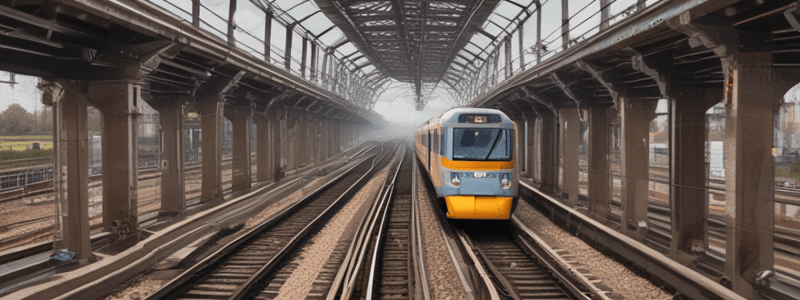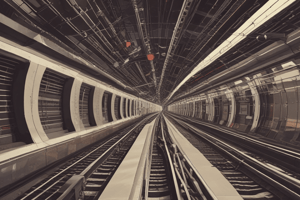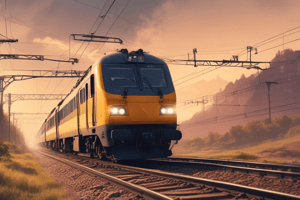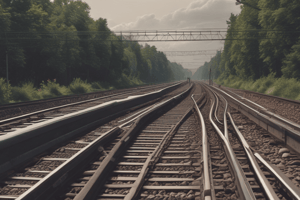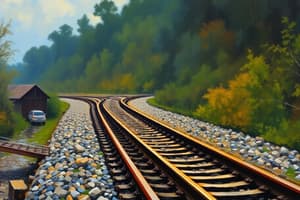Podcast
Questions and Answers
What is the recommended ballast cushion depth when the radius of curvature is flatter than 600 M?
What is the recommended ballast cushion depth when the radius of curvature is flatter than 600 M?
- 350 mm (correct)
- 300 mm
- 400 mm
- 250 mm
What is the minimum formation width recommended for new works in both embankment and in cuttings?
What is the minimum formation width recommended for new works in both embankment and in cuttings?
- 7900 mm
- 8000 mm
- 7850 mm (correct)
- 7500 mm
What should be the ballast cushion depth on the outside of curves with a radius of less than 600 M?
What should be the ballast cushion depth on the outside of curves with a radius of less than 600 M?
- 400 mm (correct)
- 350 mm
- 450 mm
- 500 mm
What type of track requires a ballast cushion depth of 400 mm on the outside of all curves, regardless of radius?
What type of track requires a ballast cushion depth of 400 mm on the outside of all curves, regardless of radius?
What should be the cross-slope for new works?
What should be the cross-slope for new works?
What is the recommended ballast volume for a curve with a radius of less than 600 M and a gauge sleeper of 350 mm?
What is the recommended ballast volume for a curve with a radius of less than 600 M and a gauge sleeper of 350 mm?
What is the recommended ballast cushion depth in the case of curves in passenger yards?
What is the recommended ballast cushion depth in the case of curves in passenger yards?
What should be ensured for new works in both embankment and in cuttings?
What should be ensured for new works in both embankment and in cuttings?
What is the maximum permissible cant that can be provided in a section?
What is the maximum permissible cant that can be provided in a section?
What is the primary consideration for determining the maximum cant excess?
What is the primary consideration for determining the maximum cant excess?
What is the maximum permissible speed on a 1-degree curve with a cant deficiency of 100 mm?
What is the maximum permissible speed on a 1-degree curve with a cant deficiency of 100 mm?
What is the standard specification for flat-bottom rails used on Indian Railways?
What is the standard specification for flat-bottom rails used on Indian Railways?
What are the two predominant types of rails used on Indian Railways?
What are the two predominant types of rails used on Indian Railways?
What is the purpose of surveying each curve, including fixed installations?
What is the purpose of surveying each curve, including fixed installations?
What is the maximum permissible speed on a 2-degree curve with a cant deficiency of 100 mm?
What is the maximum permissible speed on a 2-degree curve with a cant deficiency of 100 mm?
What is the reference point for instructions in case the track structure does not fulfill the requirements?
What is the reference point for instructions in case the track structure does not fulfill the requirements?
Where is the information about glued joint number, month, year of manufacturing, and the code of the manufacturer embossed?
Where is the information about glued joint number, month, year of manufacturing, and the code of the manufacturer embossed?
What is the purpose of an expansion joint installed at each end of LWR/CWR?
What is the purpose of an expansion joint installed at each end of LWR/CWR?
What type of SEJ is provided between two different rail sections?
What type of SEJ is provided between two different rail sections?
What is the primary material used in the manufacture of Elastic Rail Clip (ERC)?
What is the primary material used in the manufacture of Elastic Rail Clip (ERC)?
Where can detailed information about glued joints and SEJ be found?
Where can detailed information about glued joints and SEJ be found?
Why are rail joints avoided in small bridge openings less than 6.1 m?
Why are rail joints avoided in small bridge openings less than 6.1 m?
What is the primary function of Grooved Rubber Sole Plate (GRSP)?
What is the primary function of Grooved Rubber Sole Plate (GRSP)?
What is the characteristic of the top layer of Composite GRSP?
What is the characteristic of the top layer of Composite GRSP?
What is the preferred position of the rail joint in bridges?
What is the preferred position of the rail joint in bridges?
What type of girders are provided with camber?
What type of girders are provided with camber?
What is the specification for 6.2 mm Composite GRSP?
What is the specification for 6.2 mm Composite GRSP?
How are tracks laid on bridges with camber?
How are tracks laid on bridges with camber?
What is the purpose of Liner in conjunction with GRSP/ CGRSP and rail?
What is the purpose of Liner in conjunction with GRSP/ CGRSP and rail?
What is the primary application of Nylon Cord Reinforced GRSP?
What is the primary application of Nylon Cord Reinforced GRSP?
What is the specification for 6 mm thick Nylon Cord Reinforced GRSP?
What is the specification for 6 mm thick Nylon Cord Reinforced GRSP?
Where should the harder layer of Composite GRSP be placed in relation to the rail?
Where should the harder layer of Composite GRSP be placed in relation to the rail?
What is the weight of the ERC-J type rail?
What is the weight of the ERC-J type rail?
What is the thickness of GRSP for 52 kg Rail and 52 kg Sleeper?
What is the thickness of GRSP for 52 kg Rail and 52 kg Sleeper?
What is the RDSO drawing number for GRSP Set for Turnout 1 in 12 - 60 kg?
What is the RDSO drawing number for GRSP Set for Turnout 1 in 12 - 60 kg?
What is the thickness of Composite GRSP for 52kg / 60 kg Rail on PSC sleeper?
What is the thickness of Composite GRSP for 52kg / 60 kg Rail on PSC sleeper?
What is the RDSO drawing number for GRSP Set for Derailing Switch (60 kg)?
What is the RDSO drawing number for GRSP Set for Derailing Switch (60 kg)?
What is the thickness of GRSP for 60 kg running rail on channel sleeper?
What is the thickness of GRSP for 60 kg running rail on channel sleeper?
What is the RDSO drawing number for 6 mm thick GRSP for SEJ?
What is the RDSO drawing number for 6 mm thick GRSP for SEJ?
What is the thickness of GRSP with horns for Turnouts (1 in 12 & 1 in 8.5)?
What is the thickness of GRSP with horns for Turnouts (1 in 12 & 1 in 8.5)?
Flashcards are hidden until you start studying
Study Notes
Cant and Curve Design
- Maximum permissible cant of 165 mm can be provided in curves to fully exploit speed potential.
- Cant deficiency of 100 mm results in maximum permissible speeds of 160 Kmph and 130 Kmph for 1 degree and 2 degree curves, respectively.
Rail and Rail Fastenings
- Rails are manufactured as per Indian Railway Standards specification for flat bottom rail (IRS-T-12).
- Flat-footed rails of 60 Kg/m and 52 Kg/m are used predominantly on Indian Railways.
- Standard sections of rails include:
- Elastic Rail Clip (ERC): manufactured from Silico-manganese Spring steel with designed Toe load at design deflection.
- Grooved Rubber Sole Plate (GRSP): manufactured from rubber compound to absorb high frequency vibrations, shocks, and reduce noise.
- Composite GRSP: developed for improved performance with two layers of different types of rubber.
- Fastenings on PSC sleepers include:
- ERC: manufactured from Silico-manganese Spring steel.
- GRSP: manufactured from rubber compound.
- Composite GRSP: manufactured to RDSO specifications for improved performance.
- Nylon Cord Reinforced GRSP: designed for use below Crossings of Turnouts.
Ballast Cushion and Track Structure
- Ballast cushion depths:
- 250 mm for straight tracks and curves of radius flatter than 600 M.
- 300 mm for curves of radius sharper than 600 M.
- Ballast cushion requirements:
- Depth of ballast cushion should be provided as per Para 212(2) of IRPWM.
- Minimum formation width of 7850 mm should be ensured for new works in both embankment and in cuttings.
Track Structure on Bridges
- Longitudinal Profile of Rails:
- No camber is provided in standard plate girders.
- Open web girders of span 30.5 m and above are provided with camber.
- Rail joints over the Bridge:
- Avoided in small bridge openings less than 6.1 m.
- Preferred position of the rail joint is at 1/3 the span from either end.
Glued Joints and Switch Expansion Joint
- Marking of Glued Joints:
- Details of glued joint number, month, year of manufacturing, and code of the manufacturer are embossed on the gauge and non-gauge face sides of the head of the rail.
- Switch Expansion Joint:
- Installed at each end of LWR/CWR to permit expansion/contraction of the adjoining breathing lengths due to temperature variations.
- Normally provided for same rail sections.
Studying That Suits You
Use AI to generate personalized quizzes and flashcards to suit your learning preferences.
